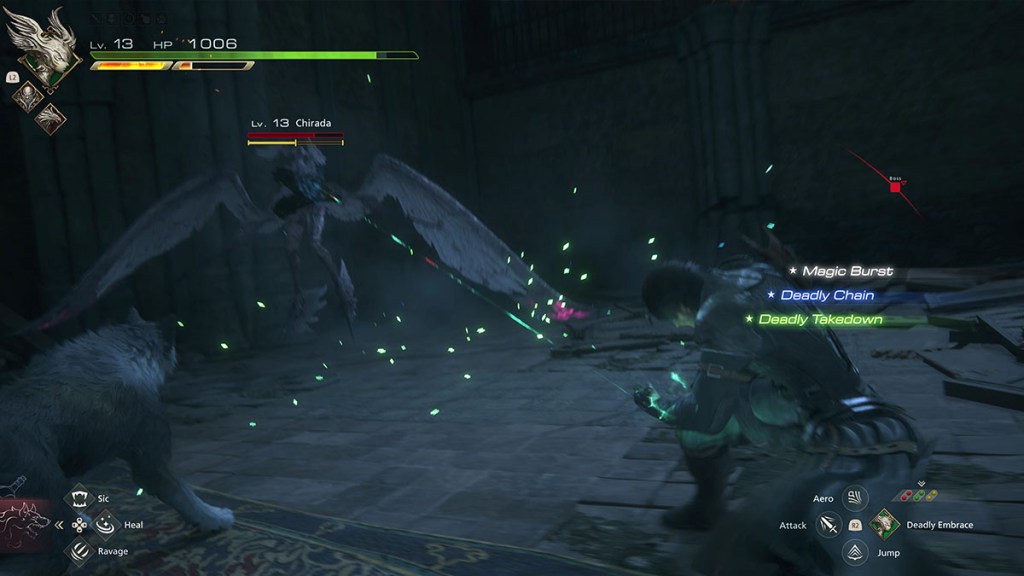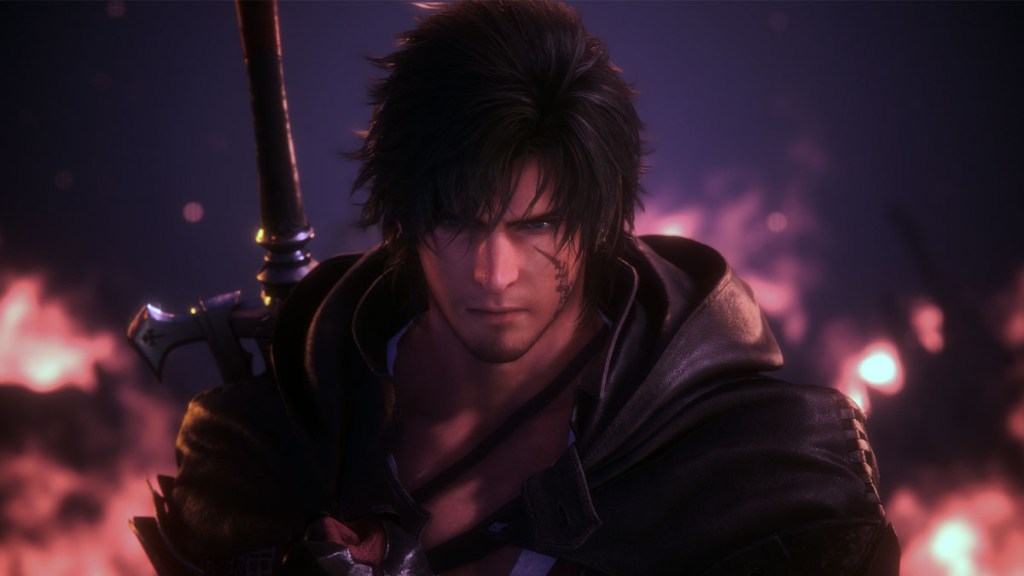Reviewing a new Final Fantasy game is tough. Final Fantasy 16 bears the weight of expectation, a burden that comes with the territory of its iconic name. Each loosely associated entry redefines what it means to be a Final Fantasy, and every fan has a checklist of what aspects of the series need to come together to make the perfect experience. So, can it live up to the titans that came before it while carving out a distinct identity of its own?
A Game of Thrones Crystals

Final Fantasy 16 centers around Clive Rosfield, the son of the Archduke of Rosaria. Rosaria is one of six nations in the land of Valisthea competing for control of the powerful Mothercrystals, shards of which grant humanity the ability to use magic. At the beginning of the game, The Archduke is preparing to lead the nation into battle to retake one of the Mothercrystals from their rivals, the Iron Kingdom.
Before the Archduke can lead his armies against the Iron Kingdom, they march to Phoenix Gate to obtain the traditional blessing of the Phoenix. The Phoenix is an Eikon, of which the Archduke’s youngest son, Joshua, is the Dominant. Dominants can call on the power of Eikons to perform incredible magical acts and can even take on their form. However, when night falls, a betrayal allows agents of another rival nation, the Holy Empire of Sanbreque, to enter Phoenix Gate and Slaughter the garrison.
Amidst the chaos, the Archduke is assassinated, and Joshua’s power as Dominant of the Phoenix comes into full bloom. He takes on the form of the powerful bird, but as Clive looks on, the second fire Eikon attacks and seemingly kills him. In the aftermath, Joshua is believed dead, and Clive is captured and forced to join Sanbreque’s army as a Bearer.
When the game picks up 12 years later, Clive is bitter and angry after over a decade of fighting as a slave of Sanbreque. The only thing motivating him to stay alive is the hope he’ll get to take revenge for his brother’s death. His chance comes to escape captivity, and he begins his hunt to find Ifrit’s Dominant and avenge his brother.
Lore drop

The above just scratches the surface of Final Fantasy 16’s lore. The world-building here is akin to that seen in Game of Thrones, and you get information thrown at you in large doses. Unfortunately, especially in the early game, the lore can be confusing.
For example, Clive is branded on the cheek, which marks him as a Bearer. However, the game doesn’t even get into the particulars of what that means for a while. You get the gist that it indicates he was enslaved, but it’s not obvious what a Bearer’s role in Valisthean society is until later in the game.
Much of the game’s story concerns the treatment of Bearers. Most humans in Valisthea cannot innately cast magic. That’s the reason the Mothercrystals and their shards are so valuable. However, some of humanity is born with the ability to use magic without crystals. These individuals are marked with a brand from birth and enslaved as Bearers. Some nations, such as Rosaria, treat their Bearers with a modicum of dignity. In others, like Sanbreque, Bearers are respected less than animals.
Fortunately, the Active Lore System allows you to reference story elements at any time, even during cutscenes. Hold the touchpad, and a screen will appear with pertinent topics. I hope this becomes the norm in RPGs because it’s incredibly useful. At some points in the game, there’s so much going on that you’ll finish a quest and then get 3-4 cutscenes telling you what happened elsewhere in the meantime. Being able to refresh your memory makes the experience a lot more enjoyable.
Uneven Quality

I won’t spoil anything, but the first third or so of the game drags a bit, but once the story gets swinging, I was hooked. The middle third of FF16 is excellent and is right up there with the best of the franchise, and then it falls apart. Unfortunately, Final Fantasy 16 suffers from the same issue we saw in some previous titles in the series.
Those who played FF8 remember how jarring it was when the game took a right turn, and Ultimecia, who we hadn’t heard of at all for the first half or so of the game, was the actual antagonist. That’s kind of what happens here, but worse. In FF16, so much time is spent establishing the six nations, the social strata of Valisthea, and all the main cast’s relationships, and then a lot of it goes out the window in the last third.
However, while the main quest is generally excellent, with a hiccup here and there, the side quests are absolutely grueling. It’s not that they’re poorly written. Each of them highlights an NPC’s story or drops some lore, but you’ll find yourself doing the same things over and over. There’s a handful of variations, but almost all of the 76 side quests boil down to this formula:
- Talk to an NPC
- (Optional) Fast travel to another NPC and talk to them.
- Fast travel and find a monster/lost person/item in another random location.
- Fight some enemies.
- (Optional) Fight an elite enemy.
- Return to an NPC to complete the quest.
The Final Fantasy series has some of the most iconic side quests in RPG history. Things like breeding Chocobos in FF7, collecting all the Triple Triad and Tetra Master cards in FF8 and FF9, and hunting down the optional summons in FFX, encouraged players to explore and provided hours of bonus content. Unfortunately, there’s nothing like that in FF16. You just check each time you complete a main quest to see if side quests have opened up. They’re even marked on your map when they’re available, so there’s no organically running into them.
A tonal departure
Square Enix leaned into Western fantasy for FF16, and you can feel the Game of Thrones influence throughout. I don’t mind the medieval setting as it returns to the series’ roots. However, it’s grim for a Final Fantasy game.
While previous Final Fantasy main titles have dealt with heady topics, most entries in the franchise contain a certain levity. Even when the world is ending, you could go breed play minigames, enjoy a hand of cards, fight a superboss, or seek out ultimate weapons. FF16 is similar to FF13 in its linearity and generally lacks the exploration elements that fans love.
Additionally, Final Fantasy games are typically fairly mild regarding violence, sex, and language. FF16 punches all that up considerably compared to previous entries. There’s a ton of blood, violence, cursing, and sexual content, which further shows the influence of A Game of Thrones. It’s all to appeal to a more adult audience, but I think it’s going to end up aging poorly.
Final Fantasy 7, for example, contains some mature themes, like environmentalism, and Aerith’s death continues to rock the gaming landscape 25 years after its release. However, it’s much more subdued, and the small amount of blood in the game is viewed from afar. It’s a game for all ages, and I continue to get something new out of it each time I play it. FF16 sometimes lacks nuance, and I don’t think time will look as favorably upon it.
Devil May Clive

Combat is another area where Final Fantasy 16 is sure to be divisive. It moves even further back from its RPG roots than FFXV and FF7 Remake and opts for a more visceral experience. It’s not quite as frenetic as Devil May Cry, but Clive’s fighting skills are more akin to Dante’s than Cloud’s.
The biggest change to combat is the elimination of the party system. You travel in a “party,” but you no longer manage anyone’s gear or abilities other than Clive. You have no control over anyone aside from him and, to a lesser extent, his dog Torgal. As a result, early on, fighting was fairly boring. In the game’s opening hours, you only have access to your Phoenix skill tree. You can unlock and level up some of your moves at this point. However, since the game is stingy with the AP needed to do so, you’re going to spend each fight using your two powerful attacks and then slapping foes around with your sword, waiting for cooldowns to end.
Things get more lively once you get some new tools to play with. You’ll eventually unlock the ability to equip up to three sets of Eikonic Abilities, which you can switch between at will during combat. At this point, you can start figuring out which abilities synergize with each other, and if you dedicate some time to learning the strengths and weaknesses of each set, Clive can become pretty much untouchable.
While I ended up enjoying the combat, FF16 feels like a big step back. There are no status effects or elemental weaknesses in this game, so every fight boils down to hitting the enemy as hard as you can as fast as you can and using health items at the right time. Final Fantasy 7 Remake found a great balance between action and traditional RPG combat (and even let you adjust it to be turn-based), and I missed the flexibility and complexity of that system here.
Final Fantasy 16 Review: Final Verdict
Final Fantasy 16 goes too far in trying to be the anti-Final Fantasy 15. For me, this series has always been about the journey, and FF16 makes a beeline for the destination from the very beginning. Valisthea is an intriguing world with rich lore, and the game’s cast is great, from Clive down to the minor NPCs. That’s why I’m so confused by the devs not giving you more opportunities to take it all in. Sure, there are a ton of bombastic moments like the Eikon fights and shocking twists, but it’s missing the quiet and silly moments that capture fans’ adoration.
It’s a great game, but it’s a mid-tier Final Fantasy. There’s a Moogle, Chocobos, and some summons, but if you replace those superficial references, you could slap another name on this game, and no one would be the wiser. Releasing it as a spin-off or a totally new franchise would have avoided some of the expectations and controversy around the title.
However, while Final Fantasy 16 may not appeal to all long-time fans due to its significant departure from typical franchise elements, there is still much to like in this title. It offers a fresh perspective, a richly drawn setting, and a captivating story that stands on its own. Its action-oriented fighting and darker themes are a departure but also highlight the series’ willingness to branch out. Even if it seems different and isn’t quite the Final Fantasy many of us grew up with, FF16 is still an exciting and enjoyable adventure. It serves as a reminder that the series isn’t hesitant to grow and defy expectations, even if the outcome isn’t unanimously praised.
Positives and Negatives
-
Main story is great aside from some stumbling in the third act.
-
Likable and well-written cast.
-
Excellent world-building.
-
Increase in explicit content goes against the franchise's identity.
-
Final Fantasy series tie-ins are superficial.
-
Side quests are boring fetch quests.
-
Major lack of exploration.
-
Combat lacks the strategic qualities seen throughout the series.







